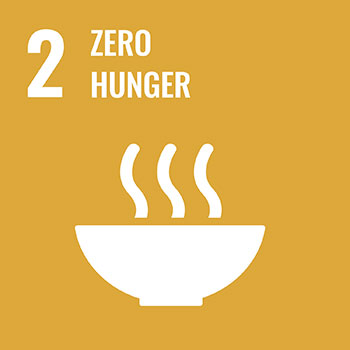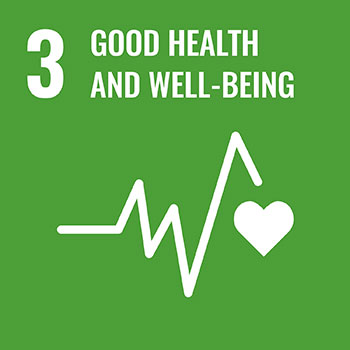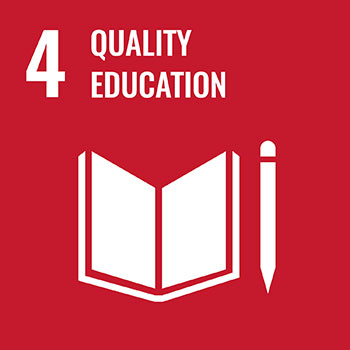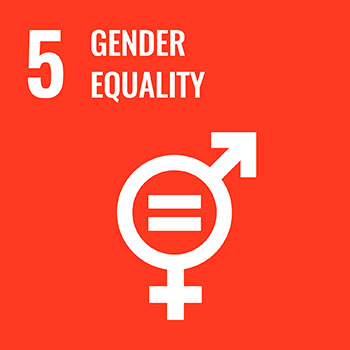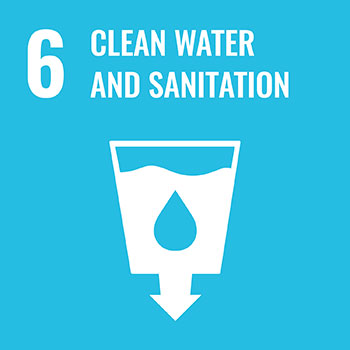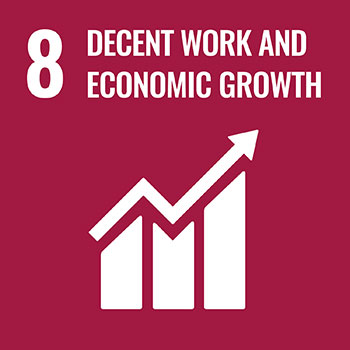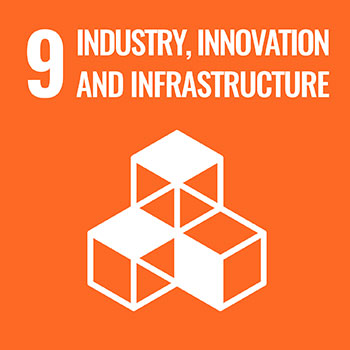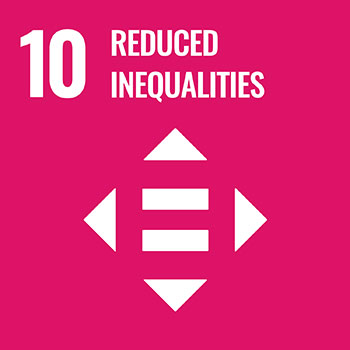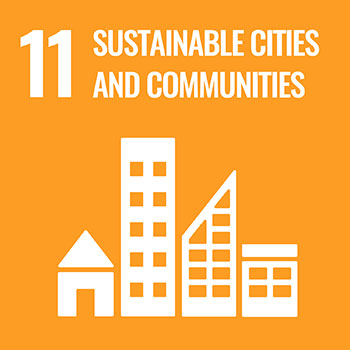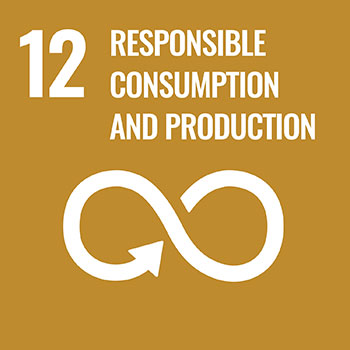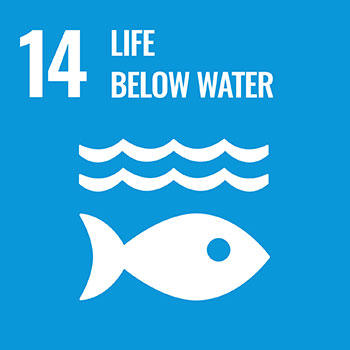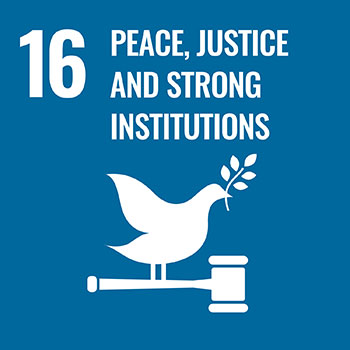Search for academic programs, residence, tours and events and more.
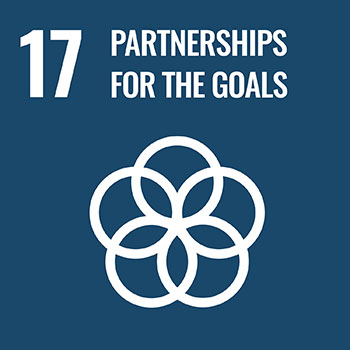
Strengthen the means of implementation and revitalize the global partnership for sustainable development.
By actively fostering partnerships and collaborations at the local, national and global levels, Wilfrid Laurier University demonstrates its commitment to SDG 17. These partnerships are instrumental in addressing complex global challenges and working toward a more sustainable and equitable future for all.
The work that Laurier completed in 2023 to advance SDG 17.
As Arctic temperatures rise, Laurier’s Homa Kheyrollah Pour is partnering with northern Indigenous communities to ensure safe winter travel.
Falling Through the Cracks is part of an ongoing research collaboration between Laurier students and faculty members and the Lived Expertise Working Group (LEWG), an advisory panel providing input on the City of Kitchener’s housing strategy. LEWG members conceptualized and led the project as part of Laurier’s Applied Community Research course, which partners students with local organizations to address an identified practical need. The exhibit features photos taken around Waterloo Region to highlight the impacts of homelessness and opportunities to address housing insecurity.
As part of Laurier’s strategy to foster enriching partnerships, the university is strengthening its partnership with Community-Based Research Canada, a national champion and facilitator of community-based research.
Laurier has teamed up with SpacesShared, an online platform that pairs students looking for affordable accommodations with older adults who have extra space in their homes. The partnership will create new housing options for Laurier students in Waterloo and Brantford and give older adults a way to leverage a spare bedroom for some extra income, company and assistance around the house.
Research can be done with books and beakers, but for many discoveries you’ve got to get out of the lab. That’s why Laurier researchers are frequently on the road, conducting fieldwork in far-off locales.
Laurier research centres advancing SDG 17.
The Tshepo Institute for the Study of Contemporary Africa (TISCA) is a university-wide research centre with active members across multiple faculties involved in Afrocentric research projects. TISCA’s vision is to provide scholars specializing in Africa with a platform and voice to produce and share timely interdisciplinary knowledge and discourse about issues affecting contemporary Continental Africa and its diaspora. TISCA’s mission is to promote global awareness and excellence in knowledge development on issues in contemporary Africa and the African diaspora in Canada and beyond.
The International Migration Research Centre (IMRC) serves as a node of excellence in scholarship and research, social and cultural debate, and policy formulation pertaining to international migration. The IMRC's mission is to create platforms for debate, research, policy analysis, community engagement and proposal development related to international migration and mobility at global, national, regional and local scales.
The United Nations Development Program provides a framework for defining “human security” as a freedom from fear, want, poverty and despair, and the work of the Centre for Research on Security Practices (CRSP) both engages and extends this definition. The centre does so by thinking through global and state-level practices of security and securitization that uphold structural forms of power and which, somewhat paradoxically, leave particular populations vulnerable. CRSP takes this tension as the heart of its work and the place through which a more fulsome and productive notion of security may be generated.
The Laurier Institute for Water Science is a multidisciplinary, collaborative undertaking among research faculty in the Faculty of Arts, the Lazaridis School of Business and Economics and the Faculty of Science. The focus of the institute is on research in three interconnected water-related disciplines:
The Cold Regions Research Centre was established in 1987. Initially focused on arctic and mountain glaciology and hydrology, the scope has broadened to cold regions (mountain and northern) research consulting on topics such as hydrology, climatology, glaciology, resource management, parks planning and biogeochemistry.
The Laurier Centre for Sustainable Food Systems (LCSFS) connects researchers and community partners engaged in sustainable food systems change. It creates opportunities for citizens, practitioners, policy-makers, private enterprise and academics to work together to imagine and foster food systems that are fair, healthy, ecologically regenerative, culturally appropriate, prosperous and inclusive. Using food as a lever for positive change, the LCSFS enables meaningful collaboration among people across institutions, sectors and disciplines to support community-driven research, innovative knowledge sharing, and the development of community resources and sustainable food system policy.
The Co-operators Centre for Business and Sustainability facilitates and coordinates research related to business and environmental sustainability. The centre ensures regular communication between researchers and practitioners, including strategic decision-makers in the local sustainability community. Located in the Lazaridis School of Business and Economics at Laurier, the centre hosts seminars, conferences and roundtables to discuss relevant topics aligned with practitioner needs and assists in disseminating research findings in a timely fashion to those who can use them.
The Viessmann Centre for Engagement and Research in Sustainability (VERiS) is an interdisciplinary and community-engaged research centre striving to be a catalyst and nexus for the transition toward strong cultures of sustainability. The centre understands cultures of sustainability “as characterized by shared values, symbols, rituals and practices grounded in sustainability principles leading to individual and societal choices that promote environmental protection, social justice and well-being, and a supportive economy." A culture of sustainability may exist within an organization, a building with multiple organizations or a community.
The Laurier Centre for the Study of Canada (LCSC) focuses on the interdisciplinary, multidisciplinary and comparative study of the Canadian experience. LCSC has three objectives:
In pursuit of this mission, LCSC recognizes there are expansive, evolving, and contested interpretations of Canada.
The Centre for Leading Research in Education (CLRiE) brings together Laurier faculty, staff and students, as well as researchers and partners from external community organizations with backgrounds in education, psychology, kinesiology, music, health studies, biology, languages and literatures, history, social work, youth and children’s studies, global studies and more. The centre aspires to support research and research-related activities in education. A salient feature of CLRiE is its focus on interdisciplinarity, encouraging the development of thoughtful, balanced and creative approaches to educational research in a changing world.
The Manulife Centre for Community Health Research is an interdisciplinary community development and research centre guided by multiple social determinants of health. The centre acts as an incubator for students committed to community-based scholarship and development in the field of health and well-being. The centre welcomes master’s and PhD students, as well as postdoctoral fellows, from a variety of academic disciplines to work within any of its communities of practice. Research priorities include women and gender, global health and development, Francophone issues, Indigenous health and wellness, environmental issues, community economic development and social innovation.
The Centre for Community Research, Learning and Action (CCRLA) is an interdisciplinary research centre located in Laurier’s Faculty of Science. The centre's work is focused on developing community partnerships and producing research, learning and action that advances community well-being and social justice. CCRLA facilitates community-based research by brokering linkages between community partners and Laurier student and faculty researchers. CCRLA provides an activity centre for social policy development and community action. The defining feature of the centre is its commitment to collaborative processes between university, community, industry and policy partners that honour the unique wisdom and skills of the non-academic community.
Launched in 2012, the Laurier Centre for Women in Science (WinS) is proud to champion women in science, technology, engineering and mathematics (STEM). The centre is building an inclusive scientific community through research, action and communication. Its ultimate goal is to make the centre redundant.
The Laurier Centre for Music in the Community (LCMC) was formed with a mission of connecting Laurier to the wider Waterloo Region community through musical activities, community research and collaboration. The LCMC lives out this mission through research, symposia, publishing, projects, partnerships and concerts. Using music as a conduit, it works to connect community, collaborate with music-makers, and contribute to the vitality of music and people.
Laurier initiatives in 2023 that advanced SDG 17.
The university hosts a variety of conferences, panels and events that bring together individuals from a range of sectors to discuss the SDGs. Examples include:
Laurier is committed to fostering a university culture where gender-based and sexual violence is not tolerated and survivors are believed and supported with compassion, dignity and respect. Between Nov. 25 and Dec. 10, 2023, Laurier hosted programming in support of 16 Days of Activism Against Gender-Based Violence, an international campaign that calls for action against harmful acts directed at individuals based on their gender and challenges gender inequality, the abuse of power and harmful norms. Gender-based violence disproportionately impacts women, girls, Two-Spirit, transgender and non-binary people, but men can also be impacted. Events included:
Properly addressing Canada’s housing crisis requires holistic, community-centered solutions and engagement from all levels of government. That was the message a panel of Laurier women shared with over 100 attendees during the seventh annual International Women’s Day luncheon, hosted by the Wilfrid Laurier University Alumni Association and International Women’s Forum Waterloo Chapter.
Laurier hosted three amazing speakers for the second installment of the Leaders for Sustainability Speaker Series. Alumni Dolf DeJong (Toronto Zoo), Samantha Tremmel Lamb (Conestoga College) and Faye Wood (AET Group) discussed their insights and experiences working in sustainability.
Following the 30th anniversary of the 1992 Rio Earth Summit last year, we are farther than ever from our sustainability goals. Laurier’s Centre for Sustainable Food Systems hosted a webinar with a panel of experts including Robert McLeman (Laurier), Alison Blay-Palmer (Laurier), Miriam Medel Garcia (Food Systems, Nutrition and Agroecology, Society for International Development), and Magdalena Ackermann (Global Policy Advocacy and Regional Cooperation for the United Nations Convention to Combat Desertification). The panel reflected on the intersections of food security, climate change, migration, desertification and land rights to address key directions about the future of people and the planet.
Bringing together diverse leaders in the housing policy sector, LISPOP (Laurier Institute for the Study of Public Opinion and Policy) hosted its 2nd annual Forum on Public Opinion and Housing Policy. The day-long event was held on Oct. 20, 2023. The keynote panel brought together Prentiss Dantzler (University of Toronto), Heather Rollwagen (Toronto Metropolitan University) and Sean Simpson (Ipsos Public Affairs) to explore how public opinion shapes the possibilities for meaningful policy action on housing. Additional speakers included academics, community members, and other policy stakeholders from Waterloo Region and beyond.
Laurier maintains strategic alliances with global institutions to advance the SDGs. By engaging in international partnerships, Laurier not only enhances its academic and research capabilities but also contributes significantly to global efforts to build a more sustainable and equitable world. Examples of our international collaborations focused on gathering data to advance the SDGs include:
Laurier is engaging in international collaborations to help develop and implement best practises for advancing the SDGs.
Laurier collaborates with a number of NGOs to support the advancement of the SDGs. These include:
Laurier researchers collaborate with numerous NGOs. As one example, Laurier’s Centre for Community Research, Learning and Action (CCRLA) is an interdisciplinary research centre focused on developing community partnerships, including with NGOs, and producing research, learning and action that advances community well-being and social justice. CCRLA facilitates community-based research by brokering linkages between community partners and Laurier students and faculty researchers. CCRLA provides an activity centre for community-focused and engaged research, social policy development and community action. The defining feature of the centre is its commitment to collaborative processes between university, community, industry and policy partners that honour the unique wisdom and skills of the non-academic community. CCRLA's community partners include Lutherwood, Ontario HIV Treatment Network, Sustainable Waterloo Region, Building Owners and Managers Association of Canada, and the David Suzuki Foundation.
As the regional health and wellness coordinator for Dehcho First Nations, located in the Northwest Territories, Kristen Tanche has sought to create culturally relevant resources to help inform local health care. She believes that wellness is inherently connected to language, culture, land, family and physical health, and that those values should be reflected in the health-care options available to the Dehcho Dene people.
To assist in her efforts, Tanche partnered with Laurier Professor Melody Morton Ninomiya, the Canada Research Chair in Community-Driven Knowledge Mobilization and Pathways to Wellness. Her research team synthesized 20 years of reports, meeting summaries and other existing documents, and chronicled Dehcho Dene concepts and indicators of health and wellness. They highlighted six interconnected priorities for the Dehcho First Nations to achieve wellness and healing, including on-the-land activities, language revitalization, and a strong focus on Elders and youth.
Their overarching finding was that, historically, the Dehcho’s belief system is rooted in Dene Ahthít’e, which means the ongoing relationship between Dene and the land. Being “healthy” means returning the mind, body, spirit and emotion to balance in the natural environment. This has become increasingly difficult in the context of colonialism, as the Dene struggle to live in accordance with their values and principles while being able to participate in the mainstream economy.
As part of Laurier's participation in the Sustainability Tracking, Assessment and Rating System, Laurier has developed a student Sustainability Literacy Assessment (SLA). Students are asked questions that pertain to campus involvement, sustainability expertise and understanding, and personal opinions. Example questions include:
A representative sample for Laurier's SLA is reached through distributing the survey to students registered in multiple courses at Laurier with no relation to sustainability. The results are used to inform Laurier's initiatives and programs in support of the SDGs.
Laurier is committed to providing meaningful sustainability education to all its students. This is affirmed in Goal 9 of the Sustainability Action Plan. Laurier offers 434 sustainability-focused and related courses spanning all departments and Faculties. This means that every student receiving a degree from the institution is required to receive sustainability education during their time at Laurier. Additionally, Laurier offers a range of full degrees that advance one or more of the SDGS. Examples include degrees in Applied Health Sciences, Politics, Archaeology, Environmental Sciences, Global Governance, Human Rights, Law and Society, Public Safety, Social Work, Women and Gender Studies, among many others. Sustainability courses can be taken as part of a degree requirement and/or as electives. Courses include:
Discover how Laurier is contributing to United Nations Sustainable Development Goal targets.

